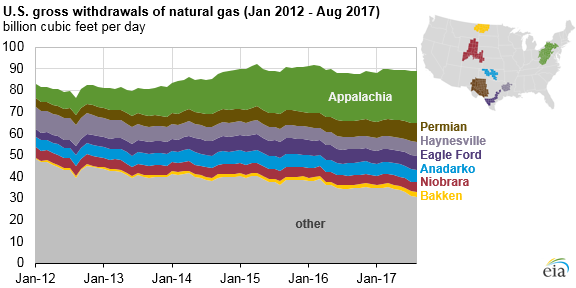Third Appalachian Basin Study In Five Weeks Confirms Fracking Not a Major Threat to Groundwater

A new peer-reviewed study from Yale University concludes that fracking is not a major threat to groundwater. This is the third study in five weeks based on water analyses in the Appalachian Basin to reach such conclusions, and is the latest of more than two dozen studies with similar results across America’s major shale plays. As the Associated Press reported Monday,
“The results suggest that, as a whole, groundwater supplies appear to have held their own against the energy industry’s exploitation of the Marcellus Shale, a rock layer more than a mile underground that holds the nation’s largest reservoir of natural gas.”
The Yale study, which was published in the Proceedings of the National Academy of Sciences on Monday, analyzed eight monitoring wells located in a 25-km area in Susquehanna County, Pa., over a two-year period before, during and after seven shale gas wells were drilled, hydraulically fractured, and brought into production. The researchers concluded,
“Collectively, our observations suggest that [shale gas development] was an unlikely source of methane in our valley wells.” (emphasis added)

Further, while the study did find that methane levels had some variance in some of the monitoring wells, the researchers concluded this was attributable to natural processes. From the study,
“[N]aturally occurring methane in valley settings, where regional flow systems interact with local flow systems, is more variable in concentration and composition both temporally and spatially than previously understood.”
As the Associated Press reported,
“Natural variability ‘is potentially a lot greater than previously understood,’ said Yale University hydrologist James Saiers, a study co-author. That’s important, he said, because residential water wells are typically tested only a few times before and after the start of drilling. ‘Before-and-after sampling might not be sufficient and might lead to misattribution of sources of methane,’ Saiers said.”
Where methane concentration fluctuations may have been related to shale development, the researchers found that “they appeared to be ephemeral, restricted to the proximity of the well pad, and too small to constitute a water-quality concern.” (emphasis added)
Yale’s study of Susquehanna County – the highest natural gas producing county in Pennsylvania in 2017 – comes on the heels of a Penn State University (PSU) study of Bradford County – the most heavily drilled county in the state – that analyzed 11,000 water samples. The PSU study found that shale development has not been a major threat to groundwater, and that water quality may have actually improved since Marcellus development began. From the PSU study’s press release:
“‘The most interesting thing we discovered was the groundwater chemistry in one of the areas most heavily developed for shale gas – an area with 1400 new gas wells – does not appear to be getting worse with time, and may even be getting better,’ said Susan Brantley, director of Penn State’s Earth and Environmental Systems Institute and distinguished professor of geosciences.” (emphasis added)
Similarly, a long-awaited University of Cincinnati study published in May that analyzed water wells in five of Ohio’s most heavily developed counties found “no relationship between CH4 concentration or source in groundwater and proximity to active gas well sites,” and no “intrusion of high conductivity fracking fluids as the number of fracking wells increased in the region.” (emphasis added)
According to the Energy Information Administration (EIA), the Appalachian Basin has been driving the growth of natural gas in the United States since 2012. Further, over the same period of time, the basin has increased natural gas production by 14 billion cubic feet per day (Bcf/d), growing from 7.8 Bcf/d in 2012 to an incredible 23.8 Bcf/d in 2017.

These three studies have demonstrated that it is possible for the tri-state region – Pennsylvania, Ohio and West Virginia – to be an important player in America’s shale story, without causing serious impacts to groundwater supplies as anti-fossil fuel “Keep It In the Ground” activists continuously suggest. And they certainly show that the fracking bans being pushed in the Delaware River Basin in Pennsylvania and Wayne National Forest in Ohio are without merit, as right here in our region, shale gas is being developed at unprecedented levels without being a detriment to water supplies.

No Comments